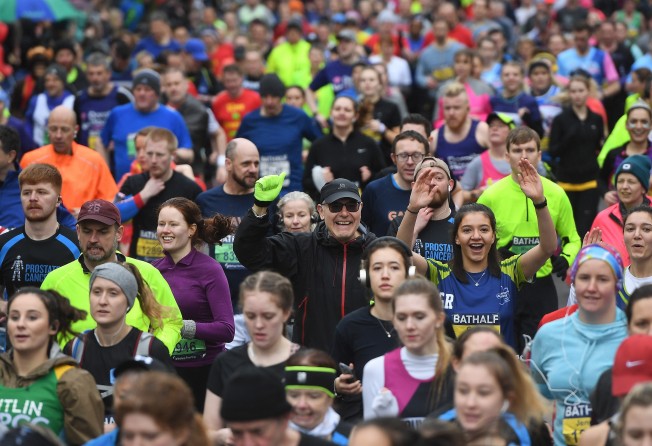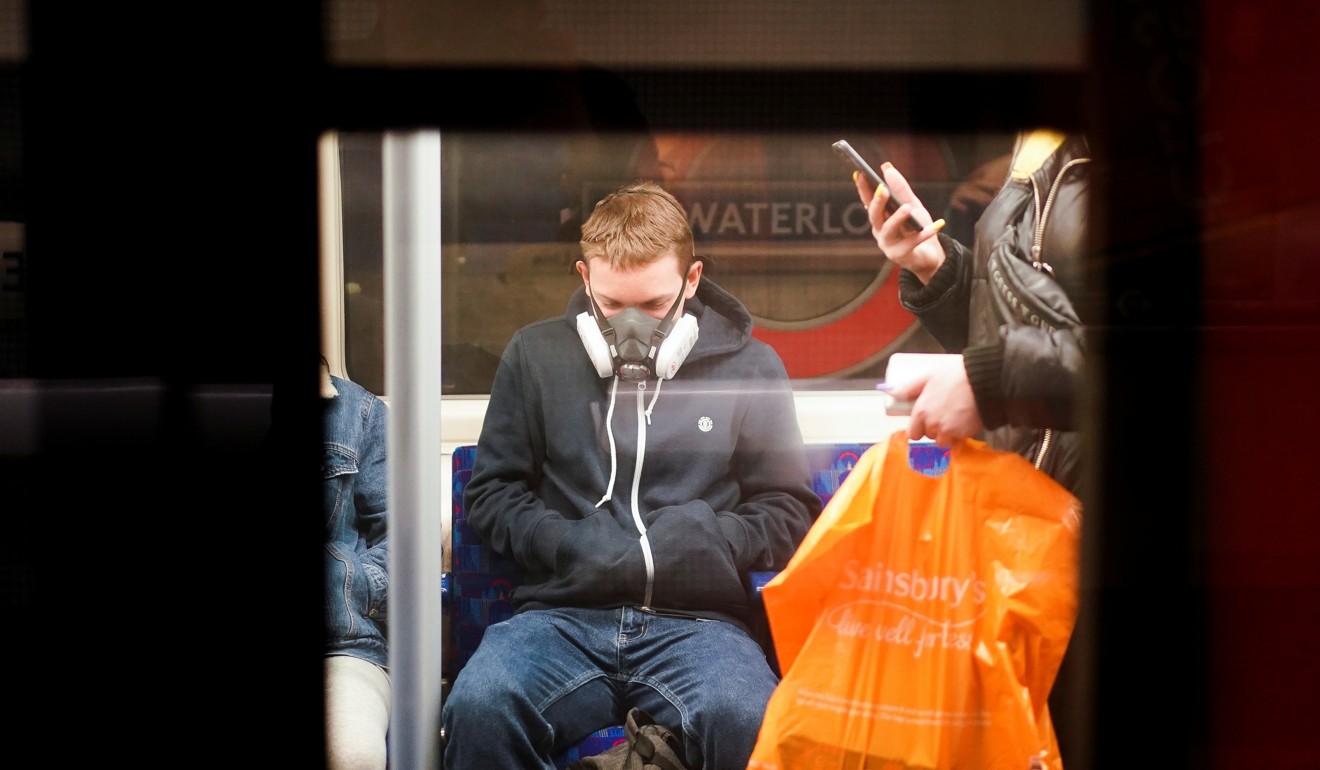Is UK’s coronavirus ‘herd immunity’ plan a deadly gamble?
- UK government criticised for not shutting down schools and banning large gatherings
- Government on back foot amid talk of allowing the population to become infected to build ‘herd immunity’

The UK government has tried to regain control of its communications strategy amid growing criticism over of its handling of the coronavirus crisis that is now threatening to engulf the country.
In a hasty statement issued late on Sunday, Downing Street said Prime Minister Boris Johnson would “lead a cross-government” drive to defeat the Covid-19 disease and would include daily press briefings to keep the public informed of developments.
“The prime minister and this government are committed to keeping the public informed every step of the way about what we’re doing to fight the spread of the of coronavirus, when we’re doing it and why we’re doing it,” the statement said. “At all times we will be led by the science to bring forward the right responses at the right time to this global pandemic.”
The UK government’s “outlier” coronavirus strategy – to delay the sort of mass lockdown underway in other European countries – has come under increasing pressure from the public and scientific community, at home and abroad. It has not shut down schools nor banned large gatherings – but that could change in coming days.
An unconfirmed leaked briefing for senior National Health Service (NHS) officials by Public Health England, published by The Guardian on Sunday, said up to 80 per cent of the population would catch the virus and 7.9 million would need hospitalisation in a pandemic that could last until spring next year. German Chancellor Angela Merkel has already warned of similar figures in her country.
Coronavirus fatalities in the UK increased by 14 on Sunday bringing the total death toll to 35 as the number of cases increased by more than 200 to 1,372.
NHS staff have been told to cut short holidays and return to work, an unknown number possibly infected.
Johnson already appears to be backtracking on a plan to allow large-scale infection among the younger population in a bid to build “herd immunity”.
On Thursday Johnson, flanked by his chief medical officer Chris Whitty and the chief scientific officer Patrick Vallance, said around 40 million Britons would need to contract the virus.
“I must level with you, the British public. Many more families are going to lose their loved ones before their time,” he said.
But amid increasing signs of a mishandled crisis strategy, and with the country still bitterly divided over Brexit, many wondered if it might be Johnson who was growing concerned about a premature departure.
The “herd immunity” strategy has been slated by some of the country’s medical establishment.
“The ultimate aim of herd immunity is to stop disease spread and protect the most vulnerable in society,” the British Society of Immunologists said in a statement.
“However, this strategy only works to reduce serious disease if, when building that immunity, vulnerable individuals are protected from becoming ill, for example through social distancing. If not, the consequences could be severe.”
Margaret Harris, a leading official with the World Health Organisation (WHO) told BBC Radio 4: “We don’t know enough about the science of this virus, it hasn’t been in our population long enough for us to know what it does in immunological terms.”
The UK government has also said it will now only test people once they have been admitted to hospital with severe symptoms.
“We are suffering a pandemic. It’s very, very serious and the government just seems to be complacent and behind the wheel on this and they are giving advice that is different in almost every other European country,” opposition leader Jeremy Corbyn told the BBC on Sunday. “This is something strange and that is why I’ve written to the prime minister demanding a meeting and also demanding to know what is going to be in the emergency legislation that is going to be presented to parliament next week.”
The only country to have adopted a similar Covid-19 strategy to the UK is Switzerland – however the government there closed schools and banned public gatherings of more than 100 people on Friday.
But infections in Switzerland jumped on Sunday by nearly 1,000 cases in 24 hours to 2,200 and 14 deaths were recorded from the virus across the country.
Health Secretary Matt Hancock appeared to backtrack on Sunday saying “herd immunity” was not a strategy, but a goal, and said the elderly may have to self-isolate for up to four months.
Writing in The Daily Telegraph, where Johnson once worked, Hancock said: “Herd immunity is not a part of it. That is a scientific concept, not a goal or a strategy. Our goal is to protect life from this virus, our strategy is to protect the most vulnerable and protect the NHS through contain, delay, research and mitigate.”
But Hancock’s chosen method of delivery, along with an article by chief medical officer Chris Whitty in the tabloid Sun newspaper raised a chorus of criticism for causing confusion and panic.
All over the country there were reports of crowds of shoppers at supermarkets, panicking to stock up on food despite reassurances in the media from supermarket bosses that supplies were sufficient.
Scenes at Lidl Burdett Road this morning pic.twitter.com/f1jOINShF1
— London & U.K Crime.. (@CrimeLdn) March 15, 2020
The UK government’s response to the coronavirus crisis also attracted criticism from abroad.
“One concern we have with cases such as UK and Switzerland isn’t just about the numbers. It is that these countries have abandoned any measure to contain or restrain the virus,” Singapore’s Minister for National Development Lawrence Wong said on Sunday.
“If there’s no attempt to contain, we estimate the number of cases in these countries to rise significantly in the coming days and weeks.”
Singapore was one of the first countries to impose strict restrictions on those with a travel history to mainland China and carried out detailed contact tracing on anyone who tested positive.
The US, Hong Kong and Singapore are now blocking flights from the UK after the centre of the pandemic shifted from East Asia to Europe. Most EU states are now shutting borders, banning large crowd events and many have closed schools.
The WHO has criticised the UK’s decision to stop testing those with mild symptoms.
“You can’t fight a virus if you don’t know where it is. Find, isolate, test and treat every case, to break the chains of transmission,” WHO director-general Tedros Adhanom Ghebreyesus said. “Every case we find and treat limits the expansion of the disease.”

The UK government is expected to make it official this week that those over 70 will be made to self-isolate. It will also introduce legislation to increase police powers to cope with the oncoming emergency.
“Our goal is to protect life from this virus, our strategy is to protect the most vulnerable and protect the National Health Service through contain, delay, research and mitigate,” Hancock said. “It’s about making sure you do the right thing at the right time.”
The UK has only 4,000 intensive care unit beds capable of treating severe cases, only 5,000 ventilators and it suffers a shortage of nurses after 10 years of government cuts to the health service.
Moreover, the UK also no longer manufactures the type of ventilators needed to effectively treat severe coronavirus cases as other EU countries scramble to boost their own capacity. Smaller ventilators used to treat less severe respiratory conditions are made by the Brears factory in Stratford-upon-Avon, bought by China’s Fosun Pharma in 2017.
Hancock incited some ridicule on social media on Sunday when he said he had asked Rolls-Royce to look into making specialised equipment, which the company denied.
In a bid to regain control of its message, the government statement released on Sunday said Johnson would speak to British manufacturers to ask them to support production of essential medical equipment for the NHS.
Additional reporting by Agence France-Presse and Bloomberg